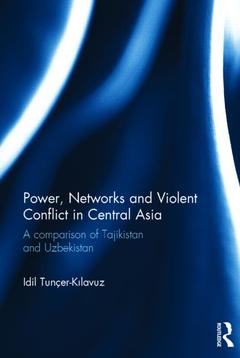Description
Power, Networks and Violent Conflict in Central Asia
A Comparison of Tajikistan and Uzbekistan
Author: Tunçer-Kılavuz Idil
Language: English
Subject for Power, Networks and Violent Conflict in Central Asia:
Keywords
tajik; civil; war; supreme; soviet; bargaining; failure; perceptions; regional; identities; Young Men; Tajikistan Civil War; Gorno Badakhshan Autonomous Oblast; Sangak Safarov; Bukharan Emirate; Atkin 1997a; Muslim Spiritual Board; Supreme Soviet; Abdullo Nuri; Bargaining Failure; National Libraries; Opposition’s Perception; Uzbek Elite; Territorial Administrative Structure; Jaba Ioseliani; Uzbek Political Elite; Elite Networks; Political Power Networks; Power Perceptions; Muhammad Solih; Georgian Political Leaders; Leninabad Oblast; Tajik ASSR; National Delimitation; Abdumalik Abdullojonov
178.41 €
In Print (Delivery period: 14 days).
Add to cartPublication date: 06-2014
Support: Print on demand
Publication date: 10-2017
· 15.6x23.4 cm · Paperback
Description
/li>Contents
/li>Readership
/li>Biography
/li>
When the five Central Asian republics gained independence from the Soviet Union in 1991, expectations of violent conflict were widespread. Indeed, the country of Tajikistan suffered a five-year civil war from 1992 to 1997. The factors that the literature on civil wars in general and on the Tajikistan civil war in particular cites as the causes of war were also present in Uzbekistan ? but this country had a peaceful transition.
Examining this empirical puzzle by isolating the crucial factors that caused war to break out in Tajikistan but not Uzbekistan, this book applies a powerful comparative approach to the broader question of why civil wars occur. Based on fieldwork in both countries, it challenges many common explanations of civil war both generally and in Tajikistan in particular. This includes highlighting the importance of elites? power perceptions, which have their origins in the interaction of structural-, process-, and network-related variables. Without examining these interactions, macro-structural explanations alone cannot explain the occurrence of civil war in one country and its absence in another.
Applying the insights of bargaining theories of war from the literature on international relations to the civil war in Tajikistan, this book will be of interest to students of violent conflict, civil wars, Central Asia and Asian Politics.
Chapter 1 Introduction
Chapter 2 The Cases of Tajikistan and Uzbekistan
in Light of Theories and Explanations of
Violent Conflict
Chapter 3 Political Power Networks
Chapter 4 Transitional Context, Events and Processes
Chapter 5 Network Establishment, Network Activation
and Violence Specialists
Chapter 6 Conclusion
İdil Tunçer Kılavuz is Assistant Professor of Comparative Politics in the Department of Political Science in Istanbul Medeniyet University. She received her Ph.D. from Indiana University in 2007. She has articles published in journals including Europe-Asia Studies, Nationalities Papers and Central Asian Survey. Her research interests include identity, conflict, violent conflict, nationalism, ethnicity, regime changes, democratization, and social movements.




